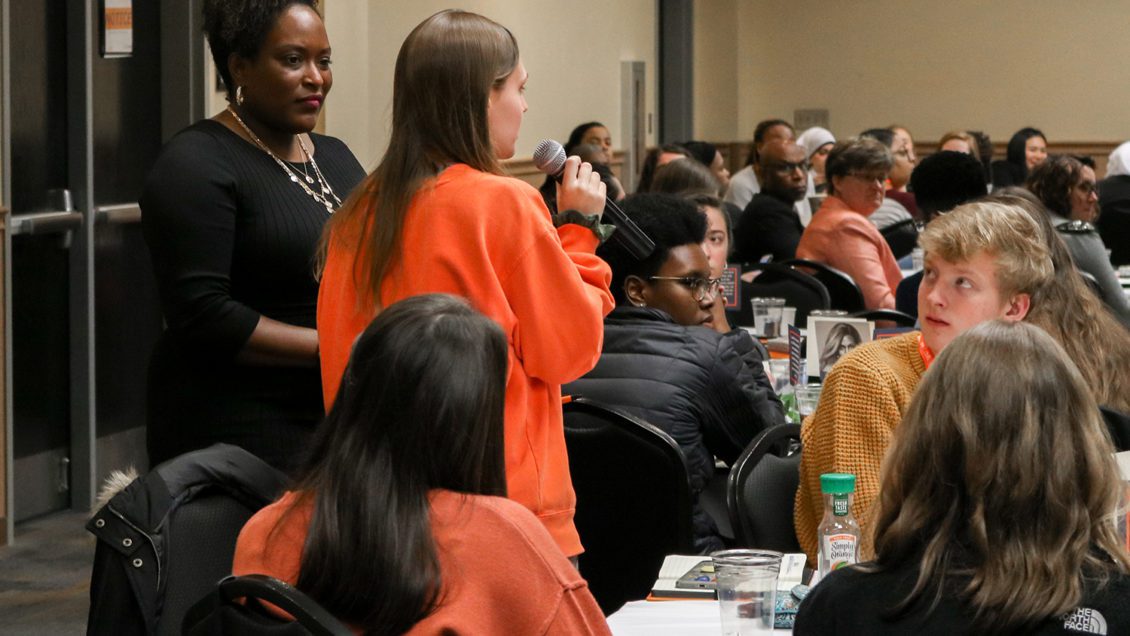Since 2006, the Women’s Leadership Conference at Clemson has fostered dialogues centered around building capacity in women’s leadership through encouraging engagement in the leadership process. Destiny Mathews, one of the students with a leadership role in the conference this past year, is especially passionate about women’s rights and leadership.

“As a woman of color, it is always interesting to see different peoples’ backgrounds and views on life,” Mathews said. “I like being able to bring awareness to issues along with making sure people are comfortable being leaders in carrying out day-to-day activities without confrontation.”
For Mathews, a senior biological sciences major at Clemson, the annual Women’s Leadership Conference offers a unique opportunity for students, faculty, staff and community members to come together to discuss important topics surrounding inclusivity, perspective and self-care.
The committee that plans the conference, including graduate and undergraduate students at Clemson, strives to create a conference every year that includes diverse topics and points of view.
“We have sessions on different backgrounds. One of the interesting ones we had was on the white woman’s point of view to cultural appropriation. We had Muslim women come and talk about their experiences, especially in America. We also had topics like self-care and other uplifting discussions,” Mathews said.
To create an inclusive environment for attendees of varying gender, racial and ethnic identities, the Women’s Leadership Conference includes sessions about self-care and other general topics in addition to its sessions about specific women’s rights issues.
“This conference is not only open to women,” said Mathews. “It’s more of an open community. You have the choice of what sessions you want to go to, and we work to have diversity in each session, so not every session is going to be geared specifically just toward women. There are other sessions covering topics like being your best self that are applicable regardless of gender, race or ethnicity.”

This year’s conference featured four concurrent sessions with multiple lectures offered during each session. Each speaker at the conference designed a talk specific to this year’s theme, “Nothing Less.” This theme was designed with the idea that women are typically forced to settle into stereotypical gender narratives in mind, and the conference aimed to empower attendees to accept nothing less than what they deserve.
“We talked about how as a person you deserve nothing less than the most, including equal rights, equal pay and other issues,” Mathews said.
This year, Mathews served on the leadership steering committee, was a part of the registration committee and was also in charge of catering. In her many roles, Mathews gained a variety of skills she will use in her future career as a nurse.
“The conference is open to all people, so there are professors, students and people from the community. Being able to mingle with these people at the conference then see them on campus is a great way to expand your social skills,” Mathews said.
Mathews has been a part of the Women’s Leadership Conference for three years, getting involved in planning the conference after she attended it herself as a freshman.

“My freshman year, I had a friend who was a women’s leadership major. They were recommending that their students go, and she asked me to tag along, so I went. After the conference, I loved it, and they had a survey that asked if you wanted to be on the committee for next year, so I chose to do that,” Mathews said.
The Women’s Leadership Conference is a largely interactive experience, as many of the sessions involve participants having open conversations about session topics and voicing their opinions on a variety of issues. For Mathews, seeing participants engage in these conversations is one of the most gratifying things about putting the conference together.
“The most rewarding part is seeing the people there engaging in conversations and being able to speak their opinions and bounce ideas off others. They can grow their leadership skills in one day in the interactive sessions we have,” Mathews said.
This year, one example of the conference’s ability to promote healthy dialogues really stuck out to Mathews.
“There was a person who was attending the conference talking to one of our committee members,” Mathews said. “They were having a great conversation and even talked through one whole session. That’s a lot of what the conference is about: bringing people together to empower each other.”
These types of conversations are vital to the conference’s mission of building leaders and promoting inclusivity.
“The main thing we want people to take away is being inclusive in their environments. We want people to be able to say ‘I came to this event and was able to speak my opinion while learning new things about people from different backgrounds,’” Mathews said. “That’s what I’ve personally gotten out of the conference.”
Get in touch and we will connect you with the author or another expert.
Or email us at news@clemson.edu

